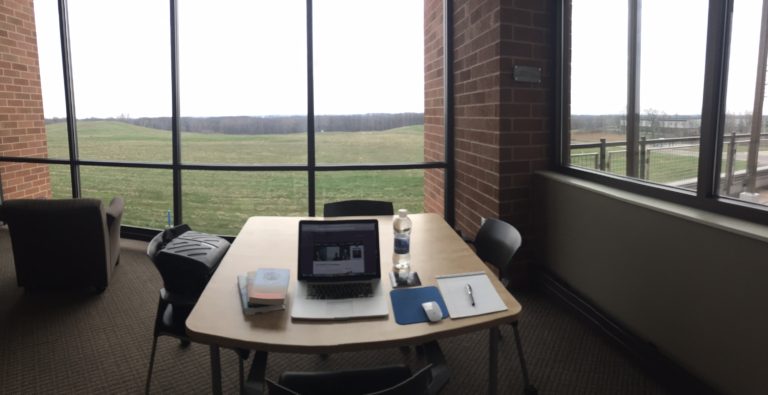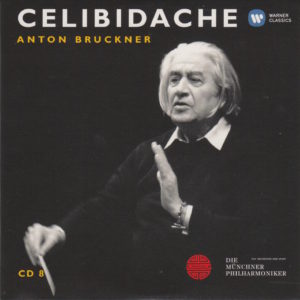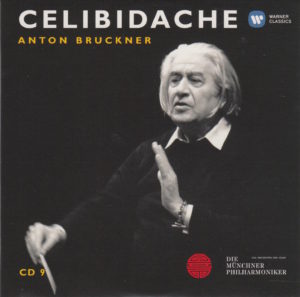 My “office” this morning is the library, one of my favorite places to be.
My “office” this morning is the library, one of my favorite places to be.
When I was a kid, I loved the library and spent hours there, sitting on the floor beside stacks of books stretching as far as the eye could see, reading.
Then, I’d check out a load of books that nearly dwarfed me, stagger out the door and tumble the books into mom’s car.
And do it all over again in a week or two.
I’ve always loved libraries, books, and writing.
So this spot is perfect for me.
 This morning, I am listening to Anton Bruckner’s Symphony No. 8 in C Minor (WAB 108), interpreted by the Romanian conductor Sergiu Celibidache (1912-1996).
This morning, I am listening to Anton Bruckner’s Symphony No. 8 in C Minor (WAB 108), interpreted by the Romanian conductor Sergiu Celibidache (1912-1996).
According to one web site, his name is pronounced: SER-zhoo Chay-lee-bee-DAH-ke.
I’ll have to take their word for it.
If you want to read the background info on Maestro Celibidache (and I really think you should – he was a fascinating guy), or read my opinion of his interpretation of Bruckner’s Third, visit Day 13.
 If you want to read my opinion of Celibidache’s interpretation of Bruckner’s Fourth, visit Day 19.
If you want to read my opinion of Celibidache’s interpretation of Bruckner’s Fourth, visit Day 19.
If you want to read my opinion of Celibidache’s interpretation of Bruckner’s Fifth, visit Day 27.
If you want to read my opinion of Celibidache’s interpretation of Bruckner’s Sixth, visit Day 35.
If you want to read my opinion of Celibidache’s interpretation of Bruckner’s Seventh, visit Day 43.
If going backward isn’t your gig, then read on…
First, the objective stuff.
Then, my opinion of the performance and box set and liner notes, etc.
HOWEVER, I can’t help but ask…
WTF?!?!?!
Today’s performance is ONE HOUR AND 46 MINUTES LONG!!!!
What in the hell was Celibidache thinking with this?!?!?!
Nearly TWO HOURS of Symphony No. 8 in C Minor?!?!?!
That went well beyond Ass Hurt Country. Celibidache is now in Patience Trying Land via the You Gotta Be Kidding Me Causeway.
Okay.
With that off my chest, here’s the objective stuff:
 Bruckner’s Symphony No. 8 in C Minor (WAB 108), composed 1884–1892
Bruckner’s Symphony No. 8 in C Minor (WAB 108), composed 1884–1892
Sergiu Celibidache conducts
Celibidache used the “1890, ed. Nowak,” according to the liner notes.
Munchner Philharmoniker (Munich Philharmonic) plays
The symphony clocks in at 106:10 (Yikes!) spread over two CDs
This was recorded in Munich, Germany, on September 12 & 13, 1993.
Celibidache was 81 when he conducted it
Bruckner was 68 when he finished composing it (the first time)
This recording was released on the Warner Classics label
Bruckner wrote his symphonies in four movements. The time breakdown of this one (Symphony No. 8 in C Minor), from this particular conductor (Celibidache) and this particular orchestra (Munchner Philharmoniker) is as follows:
I. Allegro moderato………………………………………………………………………….20:56
II. Scherzo: Allegro moderato – Trio: Langsam…………………………………………………………………………………………..16:05
III. Adagio: Feierlich langsam; doch nicht shleppend langsam…………………………………………………………………………………………….35:04
III.
IV. Finale: Feierlich, nich schnell……………………………………………………….32:08
This performance is bookended by applause, :57 seconds at the start, :57 seconds at the end.
Total Time: 106:10 (you gotta be kidding me!)
According to its entry on Wikipedia,
1890 version
Some scholars such as Deryck Cooke and Robert Haas have suggested that the 1890 revision was the product of Bruckner’s insecurity and pressure from his colleagues such as Josef Schalk: Cooke even referred to it as the “Bruckner-Schalk revision”. Against this Leopold Nowak has pointed out that there is no evidence of any handwriting other than Bruckner’s own in the 1890 manuscript. According to the testimony of Bruckner’s friends and associates the composer was extremely resistant to outside interference.
The scoring of the 1890 version is fuller and more grandiloquent than the 1887 version, with subtler textures and harmonies in the woodwind in particular, allowed for by the increased size of this section of the orchestra. It was published in 1955 in an edition edited by Leopold Nowak.
Okay. Now, here are the subjective aspects:
My Rating:
Recording quality: 3
Overall musicianship: 4
CD liner notes: 3 (thin booklet mostly about Celibidache, with a wee bit about Bruckner, translated into English, German, and French – fascinating for me, but unfulfilling as a primer on Bruckner’s symphonies)
How does this make me feel: 3
There are three things I don’t like about this performance:
1. It’s length,
2. That it’s split over two CDs,
3. That there’s limited information about the performance (not even any track listings) on the back of the CD sleeves
The Adagio, alone, is an ass numbing 35:32. The Finale adds another 32:24. To put that another way, the last two movements, all by themselves, will take over an hour to listen to.
There are two things I do like about this performance:
1. It has a certain quality to it that intrigues me. If I just sit back, go with the flow, and listen to the Adagio, for example, it has the ability to carry me away. It’s truly beautiful music, played well and conducted with an unhurried style,
2. It’s still Bruckner’s Eighth, no matter how long it is, so I’m still grooving to the Scherzo and the Finale, which – to my ears – are some of the most electrifying Classical music ever composed,
This is an interesting recording. On the one hand, it is very long, moves slowly in a few spots, and seems to lack the power more focus would have brought it. Yet, on the other hand, I’m still sucked in by the Celibidache charm and the undeniable brilliance of Anton Bruckner’s Eighth Symphony.
Plus, of all the “live” recordings I own of Bruckner symphonies, the ones from Celibidache are the livest. They start and end with applause. There are lulls between the movements that sound like what my wife and I experienced at Carnegie Hall between the movements of Barenboim’s performance of Bruckner’s Eighth. (It’s like people save up all their coughing and shuffling and sniffing and whispering until the movement ends. Then they let loose.)
So if you’re looking for a recording that sounds exactly like being there, this is it.
I dunno.
What say you?

I say this is one of my favorite Bruckner 8! But you have to be in the right mood when you listen to it and you have to have the time to sink into it.
It is much harder to play slow than fast or to quote Carlo Maria Giulini: “Playing music is like riding a bike. It is much harder to do it slow.” Very few, if any, conductors can make the music live slowly as good as Celibidache can.
/Niklas
I agree.
There’s something intriguing about Celibidache. I identify with his Zen practice, for one thing. I’m a Zen teacher and practitioner myself. So I get what he’s trying to accomplish by allowing each performance to be unique, in the moment.
Also, I agree about the time required to sink into it. It’s an unhurried performance, one of the longest I’ve ever heard for Bruckner’s Eighth. (I can’t wait to hear what Simone Young will do with B8.) 🙂
All in all, I count this as one of my favorites, largely because it’s unique. I won’t hear many like this one. I appreciate that – even if it does numb my ass.